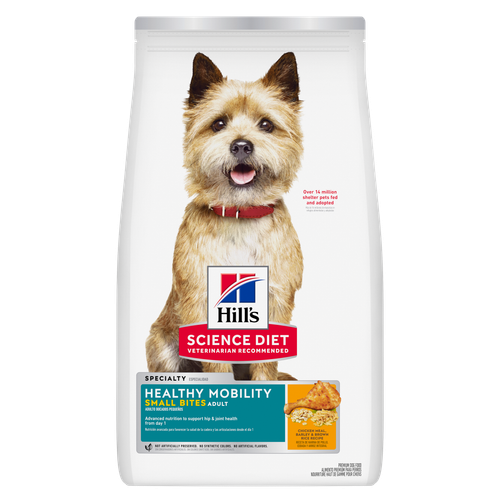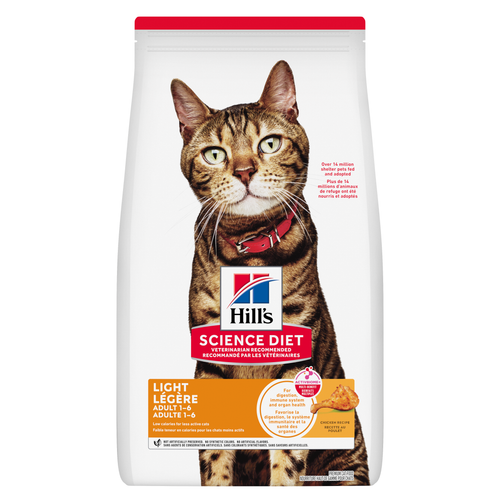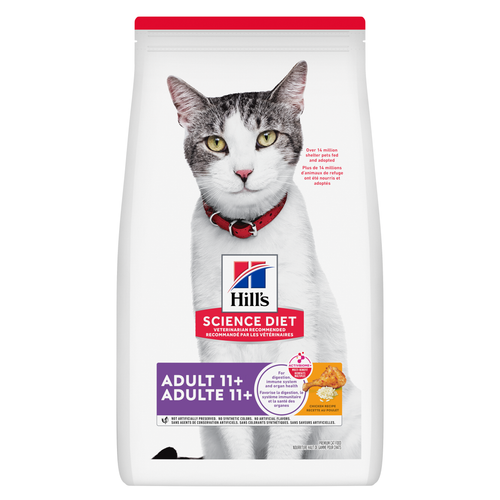
-
Find the right food for your petTake this quiz to see which food may be the best for your furry friend.Find the right food for your petTake this quiz to see which food may be the best for your furry friend.Featured products
 Adult Light Large Breed Chicken Meal & Barley Recipe Dog Food
Adult Light Large Breed Chicken Meal & Barley Recipe Dog Food18% lower calories vs. Science Diet Large Breed Adult
Shop Now Adult Healthy Mobility Small Bites Chicken Meal, Barley & Brown Rice Recipe Dog Food
Adult Healthy Mobility Small Bites Chicken Meal, Barley & Brown Rice Recipe Dog FoodAdvanced nutrition to support hip & joint health from day 1
Shop Now Adult Sensitive Stomach & Skin Small & Mini Chicken Recipe Dog Food
Adult Sensitive Stomach & Skin Small & Mini Chicken Recipe Dog FoodHill's Science Diet Sensitive Stomach & Skin Small & Mini dry dog food is tailored nutrition for Small & Mini dogs while being gentle on stomachs. Nourishes skin & promotes a lustrous coat.
Shop NowFeatured products Adult Healthy Cuisine Seared Tuna & Carrot Medley Cat Food
Adult Healthy Cuisine Seared Tuna & Carrot Medley Cat FoodDelicious seared tuna paired with tender carrots in a mouthwatering sauce
Shop Now Adult Light Chicken Recipe Cat Food
Adult Light Chicken Recipe Cat Food20% lower calories vs. Hill's Science Diet Adult
Shop Now Adult 11+ Chicken Recipe Cat Food
Adult 11+ Chicken Recipe Cat FoodSupports brain health & beautiful fur. Helps keep immune system, heart & kidneys healthy.
Shop Now -
Dog
- Dog Tips & Articles
-
Health Category
- Weight
- Food & Environmental Sensitivities
- Urinary
- Digestive
- Joint
- Kidney
- Dental
- Cancer
-
Life Stage
- Puppy Nutrition
- Adult Nutrition
- Senior Nutrition
Cat- Cat Tips & Articles
-
Health Category
- Weight
- Skin & Food Sensitivities
- Urinary
- Digestive
- Kidney
- Dental
- Stress
- Cancer
-
Life Stage
- Kitten Nutrition
- Adult Nutrition
Featured articles Water
WaterDiscover why water is the most important nutrient for your dog or cat to live a healthy life. Find out how much water your pet should consume each day.
Read More Importance of DHA in your Pet's Food
Importance of DHA in your Pet's FoodLearn about DHA, Docosahexaenoic Acid, a natural omega-3 fatty acid that is essential in the development of the brain and nervous system in cats & dogs.
Read More Antioxidants
AntioxidantsUnderstand the importance of antioxidants in your dog or cat's food, and how they can help protect your pet and keep them healthy.
Read More -


It's no surprise that your cat needs proper and balanced nutrition to live a long and pawesome life, but if you've ever found yourself wondering, "Why is my cat hungry all the time?" it's time to take a closer look into your cat's eating patterns.
Why Is My Cat Always Hungry?
Cats are typically grazers who snack throughout their waking hours, so if your cat finishes their meals and asks for more, this may indicate a problem, ranging from boredom and medical causes to simply needing more calories. Different commercially available foods have different caloric contents, and you can typically find a guide on the food container.
Because a cat's metabolism is impacted by their individual characteristics, including age, weight, and spay/neuter status, ask your veterinarian for guidance on determining your cat's ideal body weight. Your veterinarian can suggest how to adjust your cat's meal plan to safely reach and maintain their target weight. Your veterinarian may even recommend switching your cat to one of several other food options that can help them feel full and satisfied between meals.


Tasty Tips
Your Hill’s purchase helps support the Hill’s Food, Shelter & Love program, which provides food to hundreds of shelters across North America.

If your cat never seems to reach satiety, it's best to have your veterinarian examine them to ensure there isn't an underlying medical concern.
When a "Healthy Appetite" Is More Than "Healthy"
If you have trouble easily feeling your cat's ribs or you can't easily identify your cat's waist when looking down from above your cat, they may be overweight. A consistent feeding schedule may be all that they need. Many pet parents choose to free-feed their cats; however, this can lead to extra pounds and unwanted health consequences, such as joint disease and diabetes mellitus, for those cats who lack self-control.
Remember, your cat's needs will vary depending on their size, energy level and health. Your cat's age will also play a role, as a cat's metabolism slows as they age, similar to our own. Your veterinarian will be able to provide a target weight and daily calorie number your cat should be consuming.
Cat Hungry All the Time? Medical Causes of Increased Appetite
Is your cat always hungry? If your cat never seems to reach satiety, it's best to have your veterinarian examine them to ensure there isn't an underlying medical concern.
- Hyperthyroidism: This occurs when there's an excess of circulating thyroid hormones. Weight loss despite an increased appetite is a classic sign of this hormonal disease. Other signs may include muscle wasting; vomiting; increased thirst and urination; and behavioral changes, such as nervousness, hyperactivity and increased vocalization.
- Internal parasites: These parasites can quite literally steal the food your cat ingests, making your cat appear endlessly hungry, even though they aren't getting the nutrition they need to thrive. Just because you don't see worms in your cat's stool doesn't mean their gastrointestinal tract is parasite-free. An unkempt coat and runny stools are other signs.
- Diabetes mellitus: Also known as sugar diabetes, this condition causes cats to have a strong appetite while losing weight. Other clinical signs are increased water consumption and urination.
- Cancer: Though a nonspecific diagnosis, cancer is another cause of increased appetite in cats. Systemic and intestinal cancers, in particular, can increase a cat's caloric needs, while they often don't appear to put on any weight.
Cat Always Hungry? How to Occupy the Boredom Eater
Some cats are better than others at cutting themselves off from the kibble when they're no longer physically hungry. No different from some humans, some bored house cats have been known to snack purely out of boredom. Unfortunately, snacking when they aren't actually hungry can lead to a host of medical conditions, including obesity, osteoarthritis, urinary problems and diabetes mellitus. According to Cornell Feline Health Center, obese cats are twice as likely to pass away when they're middle-aged (that's ages 6-12 for cats) compared to cats with a healthy weight. With this in mind, keeping your kitty occupied with activities beyond another trip to the food dish is a smart move on your part and well worth the effort.
Originally used in zoo settings, food puzzles are a great way to stimulate kitties and mimic an environment nature selected them for. Making your cat work for their food can not only improve their health but it can also decrease unwanted behavior problems that often arise out of boredom, such as anxiety and destructive behaviors. According to the Journal of Feline Medicine and Surgery, food puzzles with rounded surfaces are best, so cats can easily bat them around. Many food puzzles are available on the market to stimulate your kitty, giving them a mental workout along with some physical exercise.
Is a Hungry Cat Always a Cause for Concern?
Each cat has a unique ideal weight and number of calories to achieve this weight, and this number may rise and fall throughout their lifespan. While it's easy for cats to gain weight, especially as they age and their activity levels fall, most cats will temporarily protest when their food is adjusted to an appropriate amount.
Keep in mind that this protesting is different from a nonstop appetite. If your cat seems insatiable or there's a change in your cat's appetite abrupt enough for you to notice, this usually indicates an underlying problem that warrants a visit to your veterinarian.


Dr. Laci Schaible is a small animal veterinarian, veterinary journalist, and a thought leader in the industry. She received her Doctor of Veterinary Medicine from Texas A&M University and her Masters in Legal Studies from Wake Forest University.

See what Vets have to say
Read reviews from the experts and see why Hill's is the #1 Veterinarian Recommended brand.
See what Vets have to say
Read reviews from the experts and see why Hill's is the #1 Veterinarian Recommended brand.




